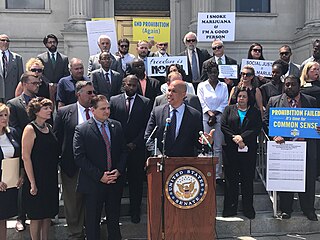
In the United States, the removal of cannabis from Schedule I of the Controlled Substances Act is a proposed legal and administrative change in cannabis-related law at the federal level. It has been proposed repeatedly since 1972. The category is the most tightly restricted category reserved for drugs that have "no currently accepted medical use."

The use, sale, and possession of cannabis containing over 0.3% THC by dry weight in the United States, despite laws in many states permitting it under various circumstances, is illegal under federal law. As a Schedule I drug under the federal Controlled Substances Act (CSA) of 1970, cannabis containing over 0.3% THC by dry weight is considered to have "no accepted medical use" and a high potential for abuse and physical or psychological dependence. Cannabis use is illegal for any reason, with the exception of FDA-approved research programs. However, individual states have enacted legislation permitting exemptions for various uses, including medical, industrial, and recreational use.

The legal history of cannabis in the United States began with state-level prohibition in the early 20th century, with the first major federal limitations occurring in 1937. Starting with Oregon in 1973, individual states began to liberalize cannabis laws through decriminalization. In 1996, California became the first state to legalize medical cannabis, sparking a trend that spread to a majority of states by 2016. In 2012, Washington and Colorado became the first states to legalize cannabis for recreational use.

The Ending Federal Marijuana Prohibition Act is a series of federal marijuana decriminalization bills that have been introduced multiple times in the United States Congress.

Cannabis in the United States Virgin Islands is legal for recreational use since January 18, 2023, under territorial law. Legislation to legalize was passed by the territorial legislature in 2022, and was signed into law on January 18. Medical use was legalized in 2019 through a bill that passed the Senate 9–4. It remains illegal under federal law.

Cannabis in New Jersey is legal for both medical use and recreational use. An amendment to the state constitution legalizing cannabis became effective on January 1, 2021, and enabling legislation and related bills were signed into law by governor Phil Murphy on February 22, 2021.

The Cannabis Act (C-45) of June, 2018 paved the way for the legalization of cannabis in Canada on 17 October 2018. Police and prosecution services in all Canadian jurisdictions are currently capable of pursuing criminal charges for cannabis marketing without a licence issued by Health Canada. The Supreme Court of Canada has held that the federal Parliament has the power to criminalize the possession of cannabis and that doing so does not infringe upon the Canadian Charter of Rights and Freedoms. The Ontario Court of Appeal and the Superior Court of Ontario have, however, held that the absence of a statutory provision for medical marijuana is unconstitutional, and to that extent the federal law is of no force and/or effect if a prescription is obtained. The recreational use of cannabis has been legalized by the federal government, and took effect on 17 October 2018.
The Strengthening the Tenth Amendment Through Entrusting States (STATES) Act was a bill proposed in the 115th United States Congress that would recognize legalization of cannabis and the U.S. state laws that have legalized it through their legislatures or citizen initiative. It was introduced on June 7, 2018, by Senators Cory Gardner and Elizabeth Warren. A companion bill was introduced the same day in the House of Representatives, sponsored by Earl Blumenauer and David Joyce. The act would amend the Controlled Substances Act of 1970 to exempt from federal enforcement individuals or corporations in states who are in compliance with U.S. state, U.S. territory and the District of Columbia, or tribal law on cannabis, with certain additional provisions such as minimum ages. The banking provisions of the STATES Act have been reintroduced as the Secure and Fair Enforcement (SAFE) Banking Act of 2019 in the 116th U.S. Congress by Ed Perlmutter in the House, and by Jeff Merkley in the Senate. As of September 18, 2019, the House bill had 206 cosponsors, and the Senate bill had 33 cosponsors.

The SAFE Banking Act, officially H.R. 1595, full title Secure and Fair Enforcement (SAFE) Act, and also referred to as the SAFE Banking Act of 2019, and as of 2023 the Secure and Fair Enforcement Regulation (SAFER) Banking Act, was proposed legislation regarding disposition of funds gained through the cannabis industry in the United States.
Cannabis legislation proposals are legislative proposals which failed to make it into law. Below are lists, broken down into national jurisdictions, of proposed legislation regarding cannabis.

The Marijuana Opportunity Reinvestment and Expungement Act, also known as the MORE Act, is a proposed piece of U.S. federal legislation that would deschedule cannabis from the Controlled Substances Act and enact various criminal and social justice reforms related to cannabis, including the expungement of prior convictions.

The Marijuana Justice Act (S.597) was a 2019 bill to remove cannabis from the Controlled Substances Act, sponsored by U.S. Senator Cory Booker. An identical bill, H.R.1456, was introduced in the House of Representatives. The bill was co-sponsored by a number of contenders for the Democratic Party's nomination for U.S. President in the 2020 election, including Kamala Harris, Elizabeth Warren, Kirsten Gillibrand, Michael Bennet, and Bernie Sanders. In February 2019, it was referred to the Committee on the Judiciary. An identically titled bill had been introduced by Senator Booker in the 2017–2018 Congress and was called "among the most notable efforts" around legalization in that session. Besides removing cannabis from the Controlled Substances Act, the bill also sought to set up a community reinvestment fund, provide for expungement of past drug convictions, and penalize states that enforce cannabis laws disproportionately.

The Medical Marijuana and Cannabidiol Research Expansion Act is an Act of Congress allowing medical research on cannabis. The act is "the first standalone marijuana-related bill approved by both chambers of the United States Congress".






